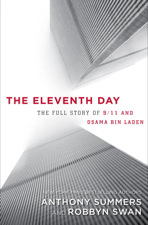As the United States approaches the 10th anniversary of the Sept. 11 attacks that shocked our nation and sent us to war, Paul O’Connor reviews a new book that tells the “full story.”
By Paul T. O’Connor
THE ELEVENTH DAY: The Full Story of 9/11 and Osama Bin Laden, by Anthony Summers and Robbyn Swan. Ballantine Books. Hardcover. 444 pages. $30.
 When The Associated Press covers breaking news, it repeatedly re-writes the top several paragraphs of its story, adding new information but tailoring the “lede” to merge with the body of the earlier story, probably three or four paragraphs down.
When The Associated Press covers breaking news, it repeatedly re-writes the top several paragraphs of its story, adding new information but tailoring the “lede” to merge with the body of the earlier story, probably three or four paragraphs down.
As events transpire, this structure gets cumbersome, so the news editor will order up a “write thru” in which the writer takes all of the information, looks at it as a whole, and then fashions an entirely new story, maybe with a new angle, usually repositioning some of the facts and quotes.
With the 10th anniversary of the Sept. 11, 2001, terrorist bombings approaching, co-authors Anthony Summers and Robbyn Swan, a married couple, have provided readers with a “write thru” of the events leading up to the attacks and those afterward. With the benefit of historical hindsight and the enormous amounts of information that have surfaced since the attacks, the authors have given readers a thorough and enlightening synopsis of the events.
In section one, the authors provide us with a step-by-step recreation of the events of 9/11, the generally accepted American version of those events. Ten years later, it is still painful to read, and it will probably remain so for Americans for so long as this nation exists.
But the interesting material begins with section two, when the authors veer from the generally accepted version of the events and into the conspiracy theories. Some say our government perpetrated the act; others blame the Israelis, the Saudis, the Iranians. The authors find little evidence to support any of the theories in their entirety.
The story of 9/11, according to these authors, is not that the Bush administration or any entity other than al-Qaida willfully conducted the attacks. It is that the United States government so woefully failed to protect itself, that time and time again American officials failed to protect our people from these attacks when they had many opportunities to do so.
The Central Intelligence Agency comes in for especially searing scrutiny because it knew several of the attackers were in the country, having identified them previously as terrorist suspects, and then did nothing to alert the FBI. Other agencies similarly failed, including the FBI, which did not act on leads from its own field agents.
The Bush administration comes under blistering review by the authors for turning its back on international terror concerns in general, and al-Qaida in particular, from Inauguration Day until late August. And, for those of us who followed that administration closely, it will come as no surprise that administration officials lied blatantly in the days and years following the attacks, all trying to cover their negligence.
The pages that describe Bush’s performance on 9/11, when he continued reading to Florida elementary school students even after being notified of the first attacks and then flew off to nowhere to leave the country in the hands of Dick Cheney, are particularly galling. The man was completely over his head as president, and it showed.
In the end, the authors return to one central question, one they’ve prepared their readers to consider in depth. How was it that two of the eventual hijackers, two men whom the CIA and the intelligence agencies of allied countries had followed around the world, were able to take part in these raids after they entered this country and lived here for more than a year? Why didn’t the CIA inform the FBI so it could keep tabs on them?
The authors can’t give us a definitive answer. We may never have that. But they’ve got a theory, and it makes the book worth reading to the end.
This is a well-written and excruciatingly well-documented book. The footnotes run for 117 pages. But Summers and Swan create, in their own reporting, the seeds of doubt we’ll all have about this and every other book or report that is ever released about 9/11. Given the enormity of the information and how it was shaped and propagandized and polluted by so many writers, conspiracy theorists and politicians, as they report, how can we trust that anyone is presenting an honest and straightforward accounting?
I suspect we’ll all live with that skepticism for the rest of our days.
* Paul T. O’Connor, contributing editor, is a university lecturer who is available for freelance writing assignments. Contact him at oco
One response to “9/11, Ten years later”
Sounds like an interesting read. I like anything that shows Bush as he truly was–a coward and a buffoon. Oh, sorry, had to vent. Nice review!